Houston Toad Faces Uphill Battle but Refuses to Croak
By Michael Minasi
Reporting Texas
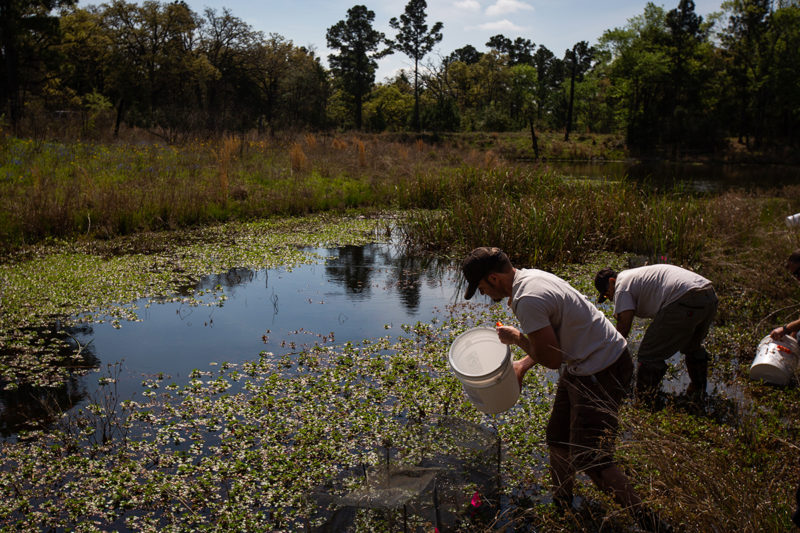
U.S. Fish and Wildlife employees Justin Crow, fish biologist, and Bob Miller, biological science technician, help deposit Houston toad eggs into a pond on Wednesday, March 27, 2019, in Bastrop State Park. Michael Minasi/Reporting Texas
This story also appeared in the Austin American-Statesman.
BASTROP— Sunlight pierces the clear water of a pond deep in the heart of Bastrop State Park. On a warm day at the end of March, a couple hundred two-week-old Houston toads, still in the tadpole stage of their development, stand out like drops of black ink in a glass of water.
“Look at that big group of ‘em at the edge there,” says D.J. Stout, a Texas State University biologist, pointing at a group bunching up in the shallows.
Stout is one of about a dozen biologists and staff from the Houston Zoo, Texas State University and U.S. Fish and Wildlife Service who have been placing thousands of Houston toad eggs in the pond since the end of February. The Houston Zoo has been depositing eggs from their captive toad colony into the pond every two weeks and will continue to do so until the end of the breeding season around the end of May.
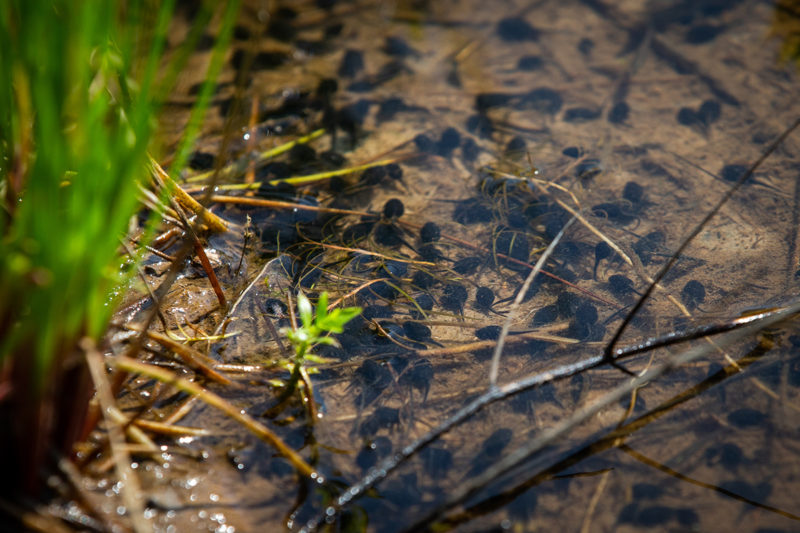
Hundreds of Houston toad tadpoles gather in the shallows of a pond on Wednesday, March 27, 2019, in Bastrop State Park. Michael Minasi/Reporting Texas
“We’re hoping to put ourselves out of business,” said Colin Thompson, Houston toad conservation program coordinator at the Houston Zoo. “We’re hoping for there to be so many egg strands being recruited naturally in the wild to where what we can do in captivity is insignificant.”
The endangered Houston toad has not been spotted in its namesake city for about half a century. It has the dubious distinction of being the first amphibian to be added to the endangered species list after the Endangered Species Act was signed into law in 1973.
Even subtle changes to the toad’s habitat can reduce its chances of survival. Ongoing habitat destruction and alteration due to urbanization and agricultural activity continues to be the most serious threat to the toad, according to the Texas Parks & Wildlife Department website.
The Endangered Species Act was designed to protect vulnerable species like the toad, but some critics worry that it hasn’t done a sufficient job of preventing habitat destruction. Mike Forstner, a biologist and toad expert at Texas State, listed a number of developments along Texas 71 in Bastrop where property owners have not met requirements to build in protected habitats. Texas 71 cuts along the southern border of Bastrop State Park, meaning that loud construction and activities can often be happening just hundreds of feet from the ponds where Houston toads breed and live.
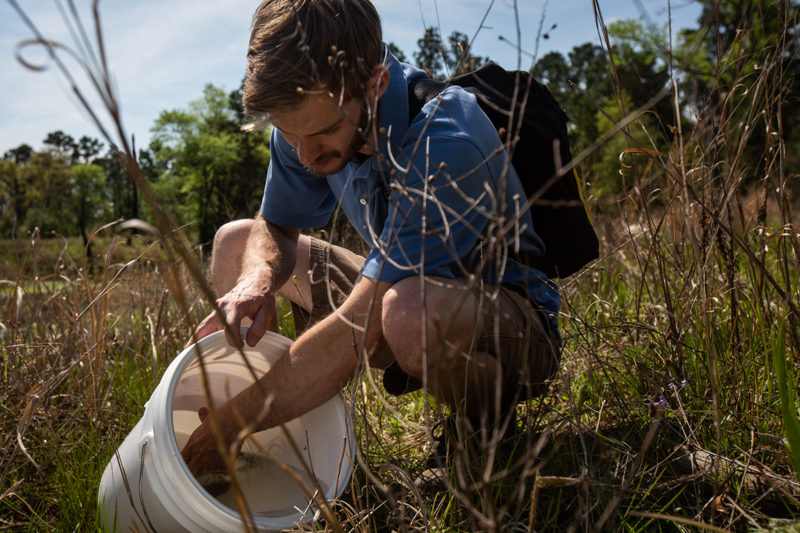
Colin Thompson, Houston Zoo toad conservation program coordinator, releases a batch of Houston toad eggs into a pond on Wednesday, March 27, 2019, in Bastrop State Park. Michael Minasi/Reporting Texas
“It’s the death of a thousand cuts, where people willingly and willfully remove endangered species habitat in Bastrop even though there’s a structure for a permit that was put in place at the county level,” Forstner said. “They ignore all of that and choose not to follow federal laws because the probability of enforcing them is low.”
Only a few thousand toads are estimated to remain in the wild, mostly concentrated around ephemeral ponds in Bastrop and Robinson counties. Recent numbers for the toad are looking better than they have in years, with populations returning to pre-2011 levels.
In 2011, devastating wildfires in Bastrop killed two people, destroyed more than 1,600 homes, and decimated large swathes of prime Houston toad habitat in Bastrop State Park and the Lost Pines forest.
“The population before the fire wasn’t great, but the population after the fire was almost nothing,” Thompson said. The Houston Zoo holds the largest assurance colony of Houston toads in captivity, at more than 600 toads. In a nondescript, specially quarantined building at the Houston Zoo, scientists breed egg strands for release into areas of Bastrop like the Griffith League Scout Ranch and in Bastrop State Park.
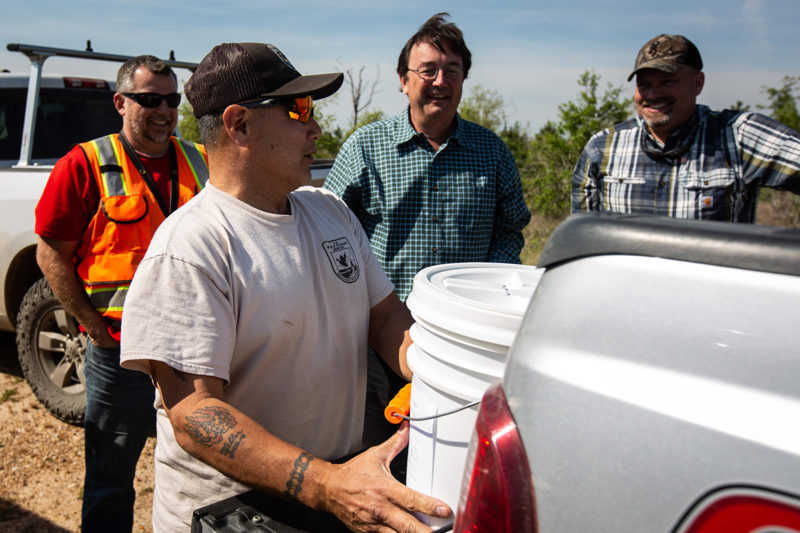
Texas State University biologists Jim Bell, left, Mike Forstner, center-right, DJ Stout, right, and Bob Miller, US Fish and Wildlife biological science technician, on Wednesday, March 27, 2019, in Bastrop State Park. Michael Minasi/Reporting Texas
Landowners have various ways to comply with the Endangered Species Act. Tanya Sommer, U.S. Fish and Wildlife supervisory biologist, said that when a development intersects with a federal agency, such as the Federal Emergency Management Agency, the U.S. Army Corps of Engineers, or the Natural Resources Conservation Service, the federal agency can secure incidental take coverage on behalf of the project.
“In the relatively few cases in which the [Fish and Wildlife Service] or [National Marine Fisheries Service] makes a jeopardy determination, the agency offers ‘reasonable and prudent alternatives’ about how the proposed action could be modified to avoid jeopardy. It is extremely rare that a project ends up being withdrawn or terminated because of jeopardy to a listed species,” according to the U.S. Fish and Wildlife Service website.
For projects impacting less than an acre of endangered species habitat, developers can submit a Habitat Conservation Plan to Fish and Wildlife. Bastrop County residents also can get incidental take permits through the Lost Pines Habitat Conservation Plan in exchange for paying mitigation fees and committing to not disturbing more habitat. Mitigation fees go to a pool of funding for securing and maintaining toad habitat.
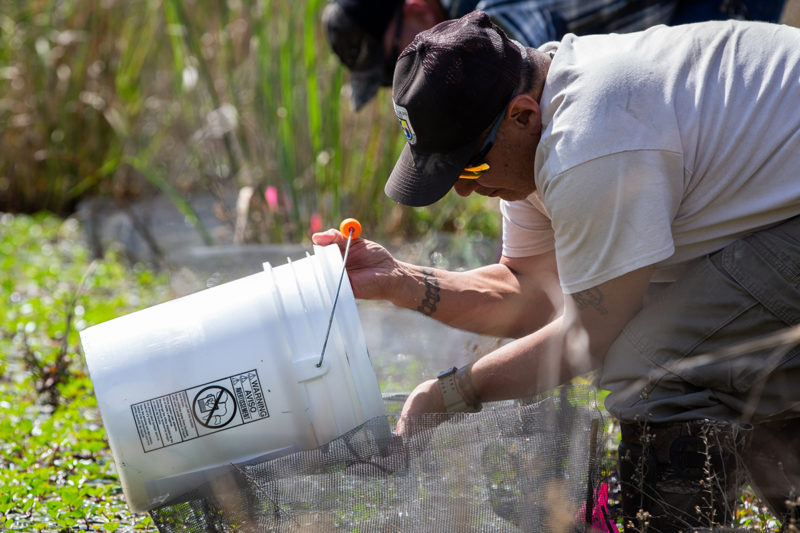
Bob Miller, U.S. Fish and Wildlife biological science technician, gently pours a strand of Houston toad eggs into a pond on Wednesday, March 27, 2019, in Bastrop State Park. Michael Minasi/Reporting Texas
Landowners who want to do more for the Houston toad can apply for a Safe Harbor Agreement that empowers them to adopt conservation measures such as prescribed burning, protecting small ponds that are critical for breeding and preventing overuse of grasslands by livestock or sod operations, said Meredith Longoria, Texas Parks and Wildlife’s nongame and rare species program supervisor. She emphasized that the vast majority of Houston toad habitat is on private land and protecting it requires the collaboration of property owners.
Knowingly violating the Endangered Species Act, which can include everything from trafficking animals into or out of the country to the “taking” of an endangered species (in other words, harassing, trapping, collecting, harming or killing), can result in civil penalties up to $25,000. Still, critics point out the difficulty of enforcing the act with a smaller species like the Houston toad.
“You shoot an eagle, you can find the body,” Forstner said. “You run over a toad — it’s pretty hard to find a dead toad that’s been run over 30 times by a bulldozer. It’s an apricot-sized water balloon hit by a bulldozer.”
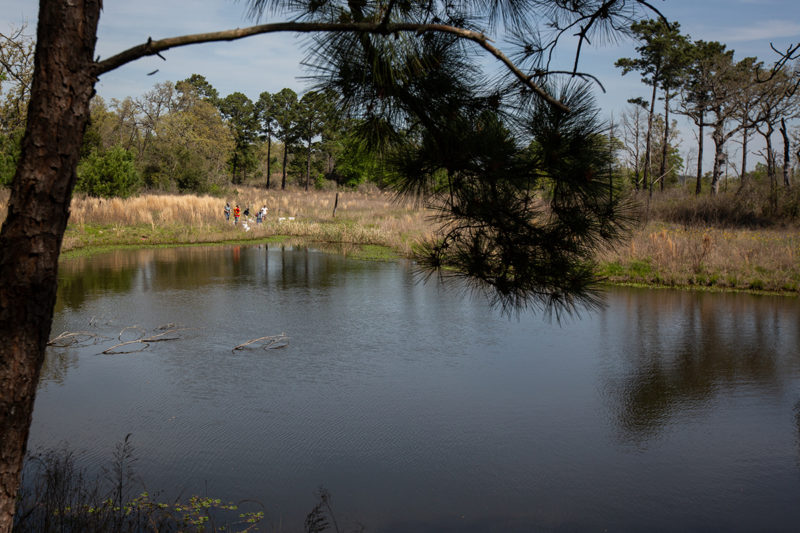
Biologists from the Houston Zoo, Texas State University, and US Fish and Wildlife deposit Houston toad eggs in a pond on Wednesday, March 27, 2019, in Bastrop State Park. Michael Minasi/Reporting Texas
Houston toads are year-round residents of Texas, but the months that they are most active in tend to be staggered slightly with the more populous Gulf Coast toads found throughout Central and South Texas. Houston toads are the first amphibians coming out of the water and eating insects as the weather warms up in the spring. Once they have finished their active breeding season they take a more passive role so the next round of amphibians can come out of the water to take over eating those insects.
“So they are not only good insect population control but they are just another species that we want to have around if we don’t want to live in a world that is just full of grackles, pigeons, raccoons and mosquitos,” Thompson said.
Stan Mays, curator of herpetology and etymology at the Houston Zoo, agrees.
“Just the idea that the Houston toad is a native Texan is reason enough to want to help it survive,” Mays said.